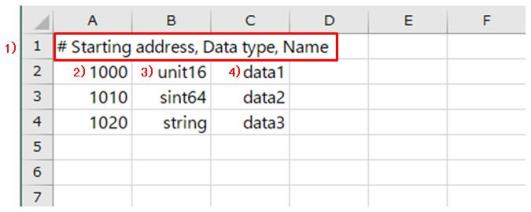Official | HULFT IoT EdgeStreaming Adapter Reference First Edition: July 1, 2021
Write holding registers
This operation writes values to the holding register of Modbus protocol-compatible equipment.
The Modbus adapter has specific functional restrictions.
For details on the functional restrictions, refer to Functional restrictions specific to Modbus adapter.
You can display the write holding registers operation screen by displaying the script canvas on the Designer screen, clicking the following items in the following order, and then dragging and dropping the component icon onto the script canvas:
-
Tool palette > Industrial equipment > Modbus > Write holding registers

Figure 5.8 Write holding registers operation screen
(1) Field list
This is a list of the fields to configure for the write holding registers operation.
|
Field Name |
Initial Value |
Setting Value |
Omission |
Notes |
|
|---|---|---|---|---|---|
|
Name |
|
Single-byte alphanumeric characters and certain symbols (*1) |
- |
A value that begins with a single-byte alphabetic character |
|
|
Input data |
(No input data) |
Name of the input data component |
- |
Select from list (*2) |
|
|
Required settings |
|||||
|
|
Destination |
|
|
- |
|
|
Slave ID |
01 |
From 01 to FF |
- |
Select hexadecimal |
|
|
Target |
(*3) |
|
- |
|
|
|
Starting address |
|
From 0 to 65535 |
- |
Set as integer |
|
|
No. of registers |
1 (*4) |
From 1 to 123 |
- |
Select from list |
|
|
Data type |
Signed 16-bit integer |
|
- |
Select from list |
|
|
Name |
|
|
- |
|
|
|
Comment |
|||||
|
|
Comment |
|
Characters |
✓ |
|
|
✓ |
: |
Possible to omit |
|
- |
: |
Impossible to omit |
|
*1 |
: |
Only "_" (underscore) can be specified. |
|
*2 |
: |
When component icons for input or conversion are placed on the script canvas, the options are displayed in the list. |
|
*3 |
: |
The check box is selected for the target of holding register writing. |
|
*4 |
: |
The initial value changes depending on the value selected for Data type. |
(2) Description of each field
This section explains each of the fields to configure for the write holding registers operation.
After changing these settings, click Finish to save the settings.
Click Cancel to discard the changes.
- Name
-
Name of the write holding registers operation component
Single-byte alphanumeric characters and "_" (underscore) can be used.
Use a value that begins with a single-byte alphabetic character.
- Input data
-
Selection of the component name of the input data for the write holding registers operation
From the input data component names displayed in the list, select the component name for the write holding registers operation.
Required settings
- Destination
-
Modbus destination
Select the Modbus destination for writing holding registers.
When you click Add, the Modbus TCP connection settings screen appears.
For details on the Modbus TCP connection settings screen, refer to Modbus TCP connection settings.
When you click Edit list..., the editing screen for the resource list appears.
For details on the editing screen for the resource list, refer to Edit resource list.
- Slave ID
-
Slave ID
Select the slave ID for writing holding registers.
- Target
-
Selection of the target registry
Select the target registry for writing holding registers.
Select the registry on which you want to write holding registers after the register map is added.
Click Up or Down to move the selection.
Click Add or Delete to add or delete a register map.
You can use Read register map from file to read a register map from the following file formats:
-
.xlsx
-
.csv
For the input method for register maps, refer to (3) Input example of register map.
-
- Starting address
-
Starting address
Specify a numerical value from "0" through "65535" for the starting address for writing holding registers.
- No. of registers
-
Number of registers
Select the register for writing holding registers.
- Data type
-
Data type of the data for writing holding registers
Select the data type of the data for writing holding registers.
-
Signed 16-bit integer
-
Unsigned 16-bit integer
-
Signed 32-bit integer
-
Unsigned 32-bit integer
-
Signed 64-bit integer
-
Unsigned 64-bit integer
-
Single-precision real
-
Double-precision real
-
String (ASCII)
-
- Name
-
Register name
Specify the name of the register for writing holding registers.
Comment
- Comment
-
Comment regarding the write holding registers operation
You can enter a comment.
(3) Input example of register map
This section describes input examples of files that can be read by Read register map from file.
When you use CSV format, enter Starting address, Data type, and Name separated by commas.
When you use xlsx format, enter Starting address, Data type, and Name separated by cells.
Do not enter blank lines.

Figure 5.9 Input example of xlsx-format register map
1) Comment line
By adding "#" at the beginning of a line, it is considered a comment line.
2) Starting address
Enter the starting address.
3) Data type
Enter the data type in one of the following formats:
-
For signed 16-bit integer
sint16
-
For unsigned 16-bit integer
uint16
-
For signed 32-bit integer
sint32
-
For unsigned 32-bit integer
uint32
-
For signed 64-bit integer
sint64
-
For unsigned 64-bit integer
uint64
-
For single-precision real
float32
-
For double-precision real
float64
-
For string (ASCII)
string
4) Name
Enter the register name.
Official | HULFT IoT EdgeStreaming Adapter Reference First Edition: July 1, 2021